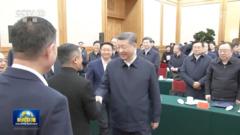Jack Ma's reappearance in the public eye at a high-profile symposium has sparked discussions about its implications for China's tech industry and the broader economy. After a tumultuous two years of retreat following his comments on the country's financial sector, the Alibaba founder's presence alongside President Xi Jinping has generated waves of optimism among analysts and investors.
Market reactions reflected this newfound optimism, with Alibaba's shares surging more than 8% following the event where the e-commerce giant announced better-than-expected financial results. Overall, Alibaba's stock has appreciated a remarkable 60% in 2023, suggesting that investors view Ma's return as a positive sign for the tech sector.
Experts are interpreting Ma's front row seat and public meeting with Xi as indicators of a potential rehabilitation, noting the absence of media coverage, which hints that he may not yet be fully restored to his former status. Analysts suggest that his presence—alongside other notable business leaders—could signal a shift in China's policies toward the tech sector, encouraging innovation and corporate growth despite prior claims of a crackdown.
During the symposium, Xi emphasized the need for private enterprises to innovate while addressing current economic challenges, interpreted widely as a signal of warm relations between the government and private businesses. The tech sector had endured strict regulations, particularly following Ma's outspoken critiques that led to a broader clampdown on high-profile companies and reforms aimed at 'common prosperity'.
As further evidence of a potential policy shift, experts noted that the meeting's guest list featured representatives from leading sectors such as telecommunications, electric vehicles, and advanced technologies—all fields deemed crucial for China's economic recovery and growth.
Additionally, this comes at a time when China's tech industry is gaining momentum due to innovative projects such as DeepSeek's new AI model, creating renewed national pride and investment in local tech firms. The challenges posed by foreign sanctions on high-tech exports have prompted a cultural shift towards self-reliance and skilled development in China.
While some analysts view Ma's reappearance as a turning point, others urge caution, suggesting that engagement will still be controlled and closely aligned with the government’s priorities for high-quality economic development. Overall, this moment of optimism may reflect a carefully navigated balance between fostering innovation and asserting governmental oversight in China's tech landscape.





















